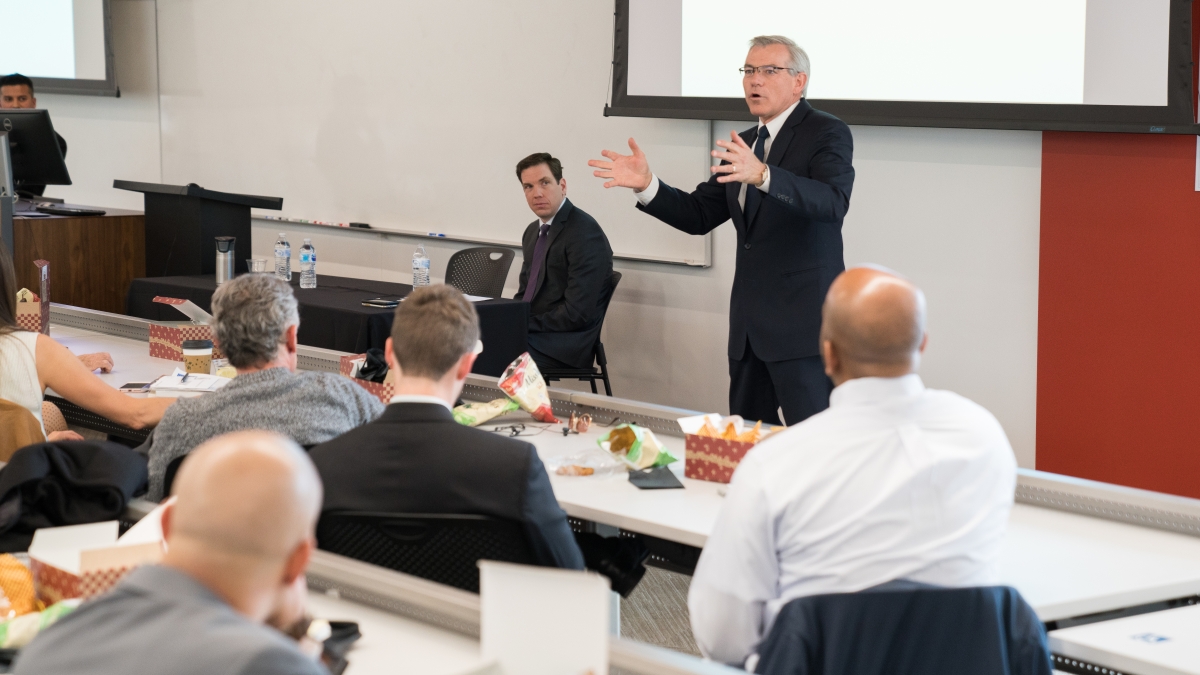Policymakers say Arizona should 'guide the narrative' on blockchain
Experts at ASU panel discuss role of government to regulate and promote the possibilities of the emerging technology

Republican Rep. David S. Schweikert of Arizona said Wednesday that the state should lead the country when it comes to developing regulation on blockchain applications and businesses and fully embrace the new technology where it concerns commerce.
“This is the future, and there’s a few of us out there that are willing to drag it through kicking and screaming because the revolution is good for all of us and society,” Schweikert said.
He spoke at a discussion on blockchain and the law moderated by Sandra Day O’Connor College of Law second-year law student Eric Cardenas at the Beus Center for Law and Society on Arizona State University's Downtown Phoenix campus.
The Center for Law, Science and Innovation hosted the event, which featured a panel of blockchain industry leaders, legislators and policy experts. The panel discussion included dialogue on the role of government policymakers, how state and federal governments are working to regulate and promote the emerging technology, and the future of blockchain regulation.
RELATED: How blockchain works
“The blockchain is a rapidly emerging technology that will disrupt, in beneficial ways, virtually every business in the United States, including law,” said Gary Marchant, faculty director for the Center for Law, Science and Innovation. “While much of the initial focus has centered on Bitcoin and other cryptocurrencies that are powered by the blockchain, it will have many other applications in finance, health care, real estate, government and business supply chains, to name just a few applications. Because of the transformative legal consequences of blockchain, we are sponsoring these public forums this spring.”
The discussion was the second of four scheduled events for ASU’s “Blockchain Speaker Series” and drew about 120 people: mostly attorneys, coding engineers and entrepreneurs. The first session, held on Jan. 17, provided a general overview of blockchain.
In addition to Schweikert, a member of the Congressional Blockchain Caucus, Wednesday's panel included Republican state Rep. Jeff Weninger, sponsor of Arizona’s Smart Contracts Law, and Paul Watkins, chief counsel for the Arizona attorney general’s office.
Time for a new framework
In 2014, the Internal Revenue Service classified digital currency as property. That outdated guidance classifies even the smallest of cryptocurrency transactions the same as buying or selling stock. Blockchain is a decentralized, digital ledger system that serves as the foundation upon which Bitcoin and other cryptocurrencies operate.
Schweikert said government policymakers have an important role to play in the success of blockchain by enabling a receptive legal framework and making sure they’re not impeded by obsolete laws and regulations.
“My greatest barrier is the regulatory world,” Schweikert said. “We’re hunting for freaky-smart people to help guide us through this change.”
Schweikert often works closely with Weninger, who has introduced several bills on cryptocurrency and blockchain regulation. Weninger said his fellow lawmakers are doing their part to keep up with the fast learning curve.
“It is a hard concept to grasp, but most of my colleagues are eager to learn,” he said. “They understand that Arizona being an early adopter of blockchain technology will benefit our state greatly in the future."
Weninger, a restaurateur and small-business owner, said structuring law on blockchain requires striking a delicate balance between common sense and being savvy enough to give entrepreneurs a fighting chance.
“We don’t want to place a burden on this technology during its infancy,” Weninger said. “My goal is to have Arizona guide the narrative on blockchain technology.”
It was a message that resonated with Watkins, who works in the civil litigation division of the Arizona attorney general’s office. He said regulators should prevent wrongdoing without creating barriers to entry.
“The role of regulation is to enhance the role of the consumer experience while protecting consumers and businesses,” said Watkins, who is promoting a “regulatory sandbox” for blockchain and other financial technology innovations to jump-start the beneficial applications of these technologies. “Change is accelerating in this industry, and it’s exciting and it’s scary.”
ASU is also accelerating research in the blockchain industry with a slew of programs and initiatives. The university formed the Blockchain Research Lab in November 2017. Its mission is to further the research and development of blockchain-related technologies for use in business, finance, economics, mathematics, computer science and other areas of potential impact. ASU has partnered with digital currency Dash to accelerate research, development and education, including the Dash Scholars Program, which provides $100,000 in scholarships for undergraduate and graduate research fellowships.
The Blockchain Speaker Series will continue on March 21 and April 18. It will feature business and legal leaders from Arizona, who will discuss the hottest blockchain entrepreneurs and how attorneys are incorporating blockchain into the practice and business of law. For more information, click here.
Top photo: Arizona Rep. David Schweikert speaks about the importance of blockchain policy in the future of Arizona business at the Sandra Day O'Connor College of Law on Wednesday. Photo by Marcus Chormicle/ASU Now
More Law, journalism and politics

ASU Law students gain vital experience through Los Angeles location
Students at the Sandra Day O’Connor College of Law at Arizona State University may be concentrated in the school’s downtown Phoenix headquarters, but they have more choices than ever when it comes to…

Where AI and property law intersect
Artificial intelligence is a powerful tool that has the potential to be used to revolutionize education, creativity, everyday life and more. But as society begins to harness this technology and its…

Distinguished filmmaker to focus on media in Indigenous communities at ASU Cronkite School
By Lauren Boykins Renowned documentary filmmaker Marcos Colón will join Arizona State University’s Walter Cronkite School of Journalism and Mass Communication in the fall as the school’s Southwest…